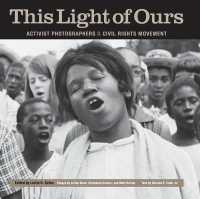- ホーム
- > 洋書
- > 英文書
- > Literary Criticism
基本説明
Offers students a deeper understanding of the artistic and cultural significance of comic books and graphic novels by introducing key theories and critical methods for analyzing comics.
Full Description
Critical Approaches to Comics offers students a deeper understanding of the artistic and cultural significance of comic books and graphic novels by introducing key theories and critical methods for analyzing comics. Each chapter explains and then demonstrates a critical method or approach, which students can then apply to interrogate and critique the meanings and forms of comic books, graphic novels, and other sequential art. The authors introduce a wide range of critical perspectives on comics, including fandom, genre, intertextuality, adaptation, gender, narrative, formalism, visual culture, and much more.
As the first comprehensive introduction to critical methods for studying comics, Critical Approaches to Comics is the ideal textbook for a variety of courses in comics studies.
Contributors: Henry Jenkins, David Berona, Joseph Witek, Randy Duncan, Marc Singer, Pascal Lefevre, Andrei Molotiu, Jeff McLaughlin, Amy Kiste Nyberg, Christopher Murray, Mark Rogers, Ian Gordon, Stanford Carpenter, Matthew J. Smith, Brad J. Ricca, Peter Coogan, Leonard Rifas, Jennifer K. Stuller, Ana Merino, Mel Gibson, Jeffrey A. Brown, Brian Swafford
Contents
Introduction: Should We Discipline the Reading of Comics? Henry JenkinsI. Form 1. Wordless Comics: The Imaginative Appeal of Peter Kuper's The SystemDavid Berona 2. Comics Modes: Caricature and Illustration in the Crumb Family's Dirty LaundryJoseph Witek 3. Image Functions: Shape and Color as Hermeneutic Images in Asterios Polyp Randy Duncan 4. Time and Narrative: Unity and Discontinuity in The InvisiblesMarc Singer 5. Mise en scene and Framing: Visual Storytelling in Lone Wolf and CubPascal Lefevre 6. Abstract Form: Sequential Dynamism and Iconostasis in Abstract Comics and Steve Ditko's Amazing Spider-ManAndrei MolotiuII. Content 7. Philosophy: "The Triumph of the Human Spirit" in X-MenJeff McLaughlin 8. Journalism: Drawing on Words to Picture the Past in Safe Area GorazdeAmy Kiste Nyberg 9. Propaganda: The Pleasures of Persuasion in Captain AmericaChristopher MurrayIII. Production 10. Political Economy: Manipulating Demand and "The Death of Superman" Mark Rogers 11. Culture of Consumption: Commodification through Superman: Return to KryptonIan Gordon 12. Ethnography of Production: Editor Axel Alonso and the Sale of Ideas Stanford Carpenter 13. Auteur Criticism: The Re-Visionary Works of Alan Moore Matthew J. Smith 14. History: Discovering the Story of Jerry Siegel and Joe Shuster Brad J. RiccaIV. Context 15. Genre: Reconstructing the Superhero in All Star Superman Peter Coogan 16. Ideology: The Construction of Race and History in Tintin in the CongoLeonard Rifas 17. Feminism: Second Wave Feminism in the Pages of Lois LaneJennifer K. Stuller 18. Intertextuality: Surrealist Intertextualities in Max's Bardin Ana MerinoV. Reception 19. Cultural Studies: British Girls' Comics, Readers and Memories Mel Gibson 20. Ethnography: Wearing One's Fandom Jeffrey A. Brown 21. Critical Ethnography: The Comics Shop as Cultural Clubhouse Brian Swafford








